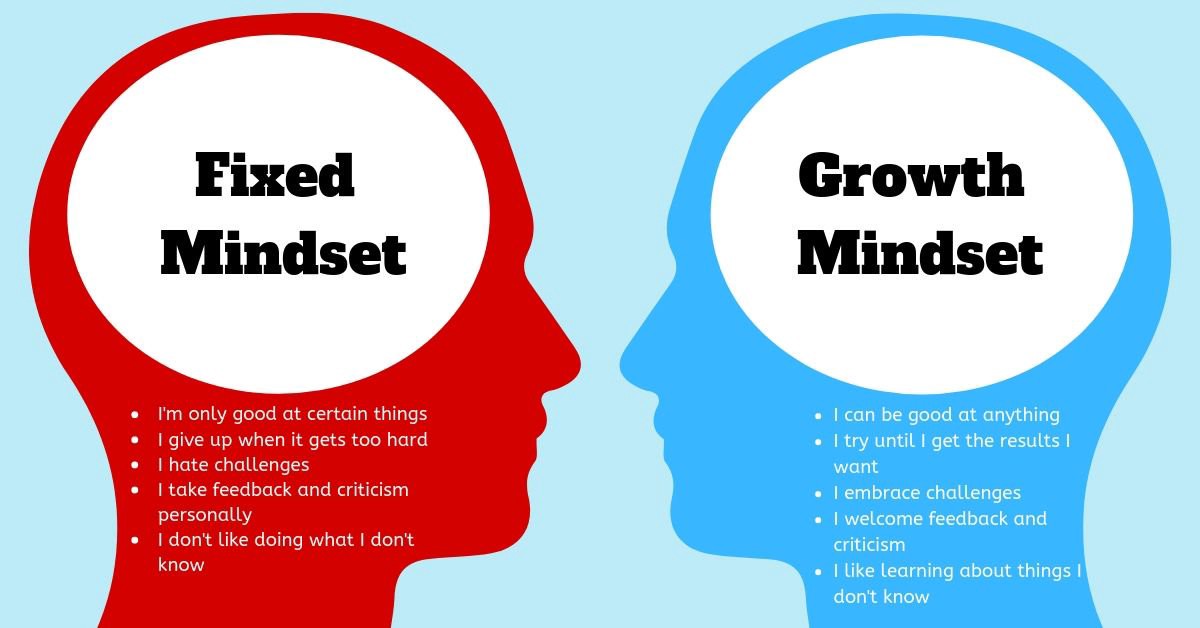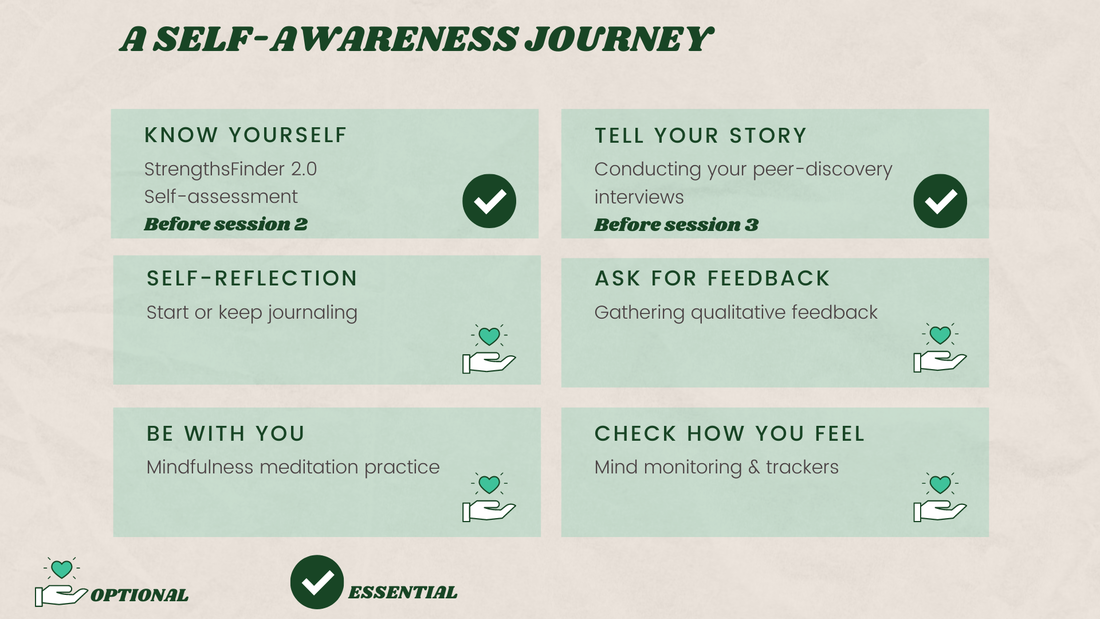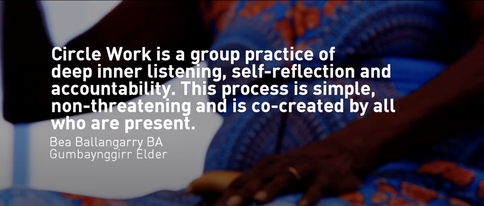Your self-inquiry menuWelcome to your self-inquiry journey. Self-awareness comes with time and experience. It is not an art form we learn in a single day. It is a lifetime pursuit of trial and error, mastered over time. Once you attain this ability to constantly increase your self-awareness, you project your uniqueness into the world.
Two activities are essential to this program:
On your self-inquiry journey, you can also explore other strategies. For example, we invite you to meditate regularly and journal. |
Starts here: "know yourself"
Being your best self means playing to your strengths at work and everywhere else.
Increase your self-awareness.
Before the next session, we invite you to take a CliftonStrengths test below.
Increase your self-awareness.
Before the next session, we invite you to take a CliftonStrengths test below.
Discover your strengths and learn how to use them to thriveBefore the next session, we invite you to take a CliftonStrengths test.
This test was invented by Don Clifton, father of Strengths Psychology and Inventor of CliftonStrengths, to Empower Human Development. According to him, it isn't until people know what makes them talented and unique that they know how to perform better in their job. Or how to find one that's a better fit. And to build better relationships and be a better teammate. And to feel like they're improving every single day. That's what Don Clifton meant when he wrote: "There is no more effective way to empower people than to see each person in terms of his or her strengths." What you can expect:
What's next?
Deadline: Before session 2 Time: 40 minutes |
Explore self-inquiry options you can practice between each session
Mindfulness meditation
|
If you could set up a regular mindfulness meditation practice while you complete the program, you increase the benefits. The mindfulness meditation sessions organised by Emmanuelle are very beneficial.
Mindfulness benefits:
|
Journaling and self reflection
|
Journaling—when done regularly—almost always leads to fresh, new insights and ideas that can absolutely transform your life. Your journal is a place to keep your memories and confide in privately.
Here are a few journaling ideas. You can use them all, combine the ones you like, or pick the single journaling idea that most resonates with where you’re at in life right now. Either to get through tough times, achieve your goals, reduce stress, or to foster creative efforts. You'll find some inspiration, we share journaling ideas below.
|
Additional ressources (optional)
YARNING CIRCLE
Embedding Aboriginal and Torres Strait Islander perspectives in the program goes beyond content, or an image or aboriginal art, respect to country. A powerful way of incorporating Indigenous perspectives is to consider working with frameworks that enable participants to experience an Aboriginal or Torres Strait Islander way of doing things.
WHAT? Yarning circles are a great tool for bringing authentic practice of speaking and listening from the heart. It is an important process within Aboriginal culture and Torres Strait Islander culture. It has been used by Indigenous peoples from around the world for centuries.
WHY? To learn from a collective group, foster honest interactions between participants, build respectful and trusting relationships, and to preserve and pass on cultural knowledge, foster accountability and provide a safe place to be heard
HOW? Participants sit together in a circle and pass a talking piece around to make it clear who is talking and who is listening Each speaker speaks spontaneously, is concise (speak the essence) and to the point. Each participant takes a deep breath and a quiet moment before they begin to speak. Every participant expresses their experience while the others listen with an open heart. There will be no judgment about what others have said. Participants need to be sensitive to time and to others. What has been said in the circle stays in the circle.
We invite you to yarn with your family, friends and colleagues. Be creative: you can experiment yarning in pair or bigger groups.
Reflect on your experience of speaking and listening from your heart.
Time: 10 minutes
WHAT? Yarning circles are a great tool for bringing authentic practice of speaking and listening from the heart. It is an important process within Aboriginal culture and Torres Strait Islander culture. It has been used by Indigenous peoples from around the world for centuries.
WHY? To learn from a collective group, foster honest interactions between participants, build respectful and trusting relationships, and to preserve and pass on cultural knowledge, foster accountability and provide a safe place to be heard
HOW? Participants sit together in a circle and pass a talking piece around to make it clear who is talking and who is listening Each speaker speaks spontaneously, is concise (speak the essence) and to the point. Each participant takes a deep breath and a quiet moment before they begin to speak. Every participant expresses their experience while the others listen with an open heart. There will be no judgment about what others have said. Participants need to be sensitive to time and to others. What has been said in the circle stays in the circle.
We invite you to yarn with your family, friends and colleagues. Be creative: you can experiment yarning in pair or bigger groups.
Reflect on your experience of speaking and listening from your heart.
Time: 10 minutes
GROWTH MINDSET
We like to think of our champions and idols as superheroes who were born different from us. We don't like to think of them as relatively ordinary people who made themselves extraordinary."
CAROL DWECK
Carol Dweck is an American psychologist. She is Professor of Psychology at Stanford University. She is known for her work on the mindset psychological trait. According to her, individuals can be placed on a continuum according to their implicit views of where ability comes from.
Watch her definition of fixed and growth mindsets from her Ted talk.
Time: 10 min
- Some believe their success is based on innate ability; these are said to have a fixed mindset.
- Others, who believe their success is based on hard work, learning, training and doggedness are said to have a growth mindset.
Watch her definition of fixed and growth mindsets from her Ted talk.
Time: 10 min

If you prefer visual data to understand growth and fixed mindsets, access infographics
Time: 1 minute
Time: 1 minute
HappinessWell-being is central to this program.
What is positive psychology?I invite you to watch this video of the founder of positive psychology Martin Seligman.
Time: 20 minutes Measure your current level of happiness using one or two validated psychological surveys. You may choose any option or any combination of options outlined below:
1. The first option is PERMA (an acronym for Positive emotion, Engagement, Relationships, Meaning, and Accomplishment— the basic dimensions of psychological flourishing). The questionnaire is 23 questions and once you submit your responses, you will receive scores ranging from 0-10 for each pillar along with scores for overall well-being, health, and negative emotions. You can take the survey here. See the book Flourish for more information. 2. The second option is based on The Authentic Happiness Inventory. It’s a quick set of 24 questions that provides an overall measure of your happiness levels. At the end of the survey you will receive a score between 1 and 5 based on your responses. If you plan on using the ReWi app, please note that you will be prompted to take this survey during the app on-boarding process. Otherwise, you can take the survey here. 3. The third option may be best suited for those who do not wish to take the online surveys for various reasons. In this case, you can ask yourself: On a scale of 1-5, how happy are you with your life right now? Your rating for this question can act as your baseline happiness metric. Time: |
The science of well being courseIn this course you will engage in a series of challenges designed to increase your own happiness and build more productive habits. Professor Laurie Santos a cognitive scientist and Professor of Psychology at Yale University reveals misconceptions about happiness, annoying features of the mind that lead us to think the way we do, and the research that can help us change. You will ultimately be prepared to successfully incorporate a specific wellness activity into your life
Time: 18 hours In this short video, Laurie Santos explains the main "re-wirements".
Time: 4 minutes
According to Laurie Santos, creating lasting happiness habits means rewire our brain.
You can choose to download the app that will help you get there. Time: 15 minutes every day |
"Woman" by Anastasia Mikova & Yann Arthus-Bertrand
In this video, Anastasia Mikova talks about her co-directing role on 'Woman', an epic documentary film she did with Yann Arthus-Bertrand, and her vision for the film.
The project is a powerful exploration of what it means to be a woman.
Anastasia says: "I feel very hopeful about the future. These women who have never been given an opportunity in their life – imagine if tomorrow their opportunity's there, what will happen? Women don't want to wait any more. We were thinking, 'Maybe if we wait, it will change. Maybe if we explain a little bit better, men will change. Maybe if this or that happens...' More and more, women say, 'I don't want to see what will happen tomorrow. I want to be part of that change and I want it to happen now.






